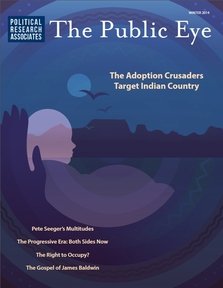Pete Seeger’s life as an activist lasted eight decades, beginning in the 1930s when he joined the Young Communist League and started roaming the nation with Woody Guthrie. He made one of his last appearances at the Farm Aid concert last September, apologizing that he didn’t have much of a voice left but leading the crowd in a sing-along of “This Land is Your Land,” just as he had countless times across the years.
Seeger, who was born in Manhattan in 1919 and died there in January, told Mother Earth News in a 1982 interview that “it’s impossible to have education without controversy.” He was often a radically divisive figure, charting a course that put him in conflict with the U.S. mainstream.He always believed in communism, which he once defined simply as “no rich and no poor,” though he later expressed regret for his ties to the Communist Party. He came from a deeply religious tradition, but the only divinity he worshiped was nature. He was deeply skeptical of the pitiless march of scientific progress and technological innovation. And he was, famously and from the outset, among the most eloquent and influential voices of the Civil Rights and anti-Vietnam War movements.
Seeger will be remembered primarily for his songs—for creating, or popularizing, social-justice anthems such as “We Shall Overcome” and “If I Had a Hammer”—but he never viewed the songs as ends in themselves, since he believed that social transformation isn’t “accomplished with words, but with actions.” He lived out that belief by devoting much of his energy over the last half-century to building the environmental movement in the United States.
Thinking globally and acting locally, he helped organize a group of residents in the Hudson River Valley to clean up the Hudson River. They built a sloop, raising money for it by holding concerts and bake sales in the small towns along the water’s edge, and in 1969 they started sailing it up and down the river, conducting educational programs onboard and organizing festivals along the shoreline. The Hudson, an industrial waste dump in the 1960s, was transformed by the 1980s. After Seeger’s death, the Guardian described his role in the project as his “greatest legacy.” The environmental group that Seeger founded to organize and expand his Hudson River activism, Clearwater, carries on the work, and the sloop maintains a busy sailing schedule.
There is irony in the fact that, for all the hope, joy, and goodwill that infuse his songs, Seeger took a dim view of humanity’s prospects, and he had doubts about what his efforts would add up to. In the 1982 Mother Earth News interview, he remarked, “There’s maybe less than a 50 percent chance that the human race is going to be around a few hundred years from now.” He described himself as an “optimist” nonetheless, because “I think there is a slim chance that the human race will survive.”
Rather than dwelling on despair, though, he used his hammer of justice to change what he could. “Since love is lord of heaven and earth,” as one of his lyrics goes, “how can I keep from singing?” The philosophy that Seeger lived by wasn’t entirely consistent, perhaps. But it built and sustained a beautiful life.
